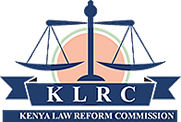1. The Kenya Law Reform Commission (KLRC) WELCOMES Parliament`s and the Attorney-General’s determination to transfer ongoing law reform, review and development of legislation for effective constitutional implementation to the Commission. This has indeed been KLRC`s traditional and statutory role even previously under the repealed Law Reform Commission Act (Chapter 3 of the Laws of Kenya) and currently under section 6 of the Kenya Law Reform Commission Act of 2013.
2. The Office Attorney General (AG) the Kenya Law Reform Commission (KLRC) and the former Commission for the Implementation of the Constitution (CIC) all draw their mandates from the Constitution. The mandates are further supplemented by the relevant statutes governing the operations of these institutions, which include, the Office of the Attorney General Act, the Kenya Law Reform Commission Act 2013 and the Commission for the Implementation of the Constitution Act. In terms of the 6th Schedule to the Constitution of Kenya 2010, the primary responsibility for the preparation of constitutional implementation legislation lies with the Office of the Attorney-General and KLRC. CIC was required to coordinate with the Office of the Attorney-General and KLRC when exercising its monitoring and facilitative role.
3. Under the framework legislation governing the operations of the Commission, KLRC has enjoyed considerable operational independence with direct responsibilities to Parliament, the Attorney-General and the people of Kenya.
4. The Commission thus considers the “additional” role that has been previously performed by CIC in constitutional implementation as NOT NEW. It all resonates with its ongoing work that broadly includes but is not limited to legal, policy and administrative research, review of policy and legislation, legislative drafting, capacity building, information sharing and public education as well as supporting both National and County Governments on technical matters of law reform.
5. Pending the formal policy decision to the transfer CIC’s residual functions to KLRC, the Commission has NOTED varied stakeholder opinions. The Commission has on one hand received huge support, while on the other some have probed the capacity and independence of the Commission to undertake this mandate. These concerns are healthy and welcome. The Commission is of the considered view that these concerns are scrutinized in the context of the Commission’s law reform work outputs in the last 30 years (since our establishment in 1982).
6. Just to mention but a few, the Commission specifically prepared the constitutional amendments and framework legislation that established the Constitution of Kenya Review Commission (CKRC) and the Committee of Experts that embarked on the new Constitution drafting process. Further, the Commission ably developed legislation that led to the implementation of the Agenda 4 Resolutions during the period just after the sad events of 2007/8. These Resolutions included the Establishment of the Grand Coalition Government through the National Accord and Reconciliation Act, The Interim Independent Electoral Commission (IIEC), The Interim Independent Boundaries Review Commission (IIBRC), The Truth, Justice and Reconciliation Commission (TJRC) and the National Cohesion and Integration Commission (NCIC).
7. In the Post-constitutional promulgation period, the Commission prepared the legislative and regulatory frameworks that established and operationalized Constitutional Commissions and Independent Offices as enshrined in the Constitution, including CIC itself.
8. In the period covering the last 5 years of Constitutional Implementation (2010-2015), development of constitutional related Bills have been a preserve of KLRC and the Office of the Attorney-General with CIC ensuring constitutional compliance and jointly providing monitoring and oversight functions during Round Table Discussions where final consensus on the contents of the Bills are arrived at before transmission to the Attorney-General, Cabinet and Parliament.
9. It is worth noting that the Commission prepared the Schedule 5 related Draft Bills well in time before expiry of the requisite time frames as stipulated in the Constitution, 2010. These are just but a few of the Commission`s contributions towards the constitutional implementation process.
10. Law reform and constitutional implementation is a continuous milieu. It is a mixture of lengthy processes that require in-depth research and consultation both locally and internationally to enable technically sound and practical solutions to meet people`s ever changing social-political and economic needs. It is never time bound.
11. The five-year transitional period which ended on the 27th of August, 2015 was, in the Commission’s view, intended to be a period for establishing the institutional mechanisms for continuous constitutional implementation well beyond the transitional period. It is important to appreciate the gallant efforts of CIC which with other stakeholders have commendably discharged their assigned responsibilities.
12. The Commission reckons that the framers of the Constitution recognized the institutionalization of other entities to guarantee that the gains achieved under the CoK 2010 are not lost, after the 5 year transition period. Specifically, Constitutional Commissions and Independent Officers are given precisely these oversight functions under Article 248 of the Constitution.
13. Purposefully, the constitutional and statutory mandate and design of KLRC by Parliament is such that it should be able to ensure continuity in this regard.
14. The Commission further ACKNOWLEDGES the principles upon which Kenyans gave themselves the Constitution of Kenya 2010 being fundamental law reform towards good governance, justice and rule of law, public participation and accountability. KLRC has and shall RESPECT the stakeholders’ active role in the ongoing law reform and commits to marshal every effort in constitutional implementation.
15. Together with other Constitutional Commissions, Independent Offices and other Non State Actors, the Commission commits to live our mission of facilitating law reform conducive to social, economic and political development. This is to be achieved by individual and collective efforts by all parties and through keeping all law of Kenya under review, ensuring their systematic development and reform in conformity with the Constitution of Kenya 2010.
Signed
Mbage Nganga, Chairman
Kenya Law Reform Commission
{jcomments on}
{jcomments off}
